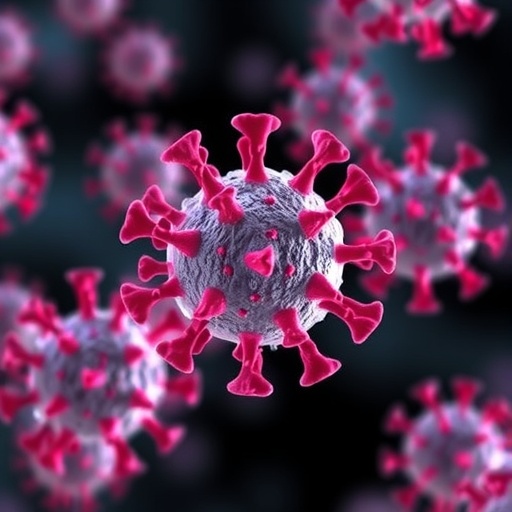
In a pioneering study from the Keck School of Medicine of USC, scientists have uncovered a critical mechanism by which the predominant cancer-causing strain of human papillomavirus (HPV16) evades the immune system. This breakthrough research reveals how HPV16 reprograms immune cells in the tumor microenvironment, ultimately suppressing the body’s natural defenses and allowing cancerous growths to flourish unchecked. The findings, published in the Journal for ImmunoTherapy of Cancer, illuminate new pathways to enhance the effectiveness of emerging therapeutic vaccines for HPV-induced cancers, which have historically seen limited success.
HPV16 is responsible for a significant proportion of cancer cases globally, implicated in over half of cervical cancers and approximately 90% of throat cancers linked to HPV. Although vaccines such as Gardasil-9 provide effective prevention when administered before viral exposure, they do not aid those who are already infected. Hence, the drive to develop therapeutic vaccines—designed to stimulate the immune system post-infection—has become an urgent focus in oncological and virological research. These vaccines aim to activate T-cells, the body’s frontline “soldier” cells, to recognize and eradicate cancer cells infected with HPV.
Despite promising efforts, therapeutic vaccines have so far demonstrated only modest efficacy. The latest USC study offers a compelling explanation rooted in immunological signaling molecules that manipulate the tumor microenvironment. Central to this process is Interleukin-23 (IL-23), a pro-inflammatory cytokine previously associated with various cancers but whose precise function in HPV-driven malignancies remained nebulous. Through sophisticated experiments utilizing both murine models and cultured human cells, the researchers discovered that HPV16’s oncogenic proteins, E6 and E7, induce nearby macrophages to secrete elevated levels of IL-23.
.adsslot_g9TWaVUQup{width:728px !important;height:90px !important;}
@media(max-width:1199px){ .adsslot_g9TWaVUQup{width:468px !important;height:60px !important;}
}
@media(max-width:767px){ .adsslot_g9TWaVUQup{width:320px !important;height:50px !important;}
}
ADVERTISEMENT
This IL-23 surge has profound consequences. Instead of galvanizing the immune system, IL-23 inhibits the proliferative capacity and cytotoxic function of tumor-fighting T-cells. These adaptations effectively cloak the tumor cells from immune surveillance, allowing them to grow and metastasize freely. Dr. W. Martin Kast, the lead investigator and a professor at USC, explained that these findings disrupt the previous assumption that inflammatory signals invariably stimulate anti-tumor immunity. Here, IL-23 plays a paradoxical role by fostering an immunosuppressive milieu that undermines T-cell-mediated cancer eradication.
To probe the therapeutic implications, the research team employed neutralizing antibodies targeting IL-23 in mouse models bearing HPV16 tumors. When these antibodies were administered in conjunction with an experimental therapeutic vaccine, the combination therapy dramatically enhanced T-cell infiltration and tumor clearance, leading to prolonged survival times. This synergy underscores the clinical potential of combining IL-23 blockade with immunotherapeutic approaches, suggesting a new frontier in personalized cancer treatment.
Importantly, IL-23 inhibitors, already FDA-approved for autoimmune disorders such as psoriasis, can be rapidly repurposed for oncological applications. This fact significantly accelerates the translational timeline, bypassing many of the traditional hurdles faced by novel drug development. Dr. Kast emphasized that leveraging these existing therapeutics could revolutionize the way HPV-related cancers, especially those resistant to current vaccine strategies, are treated in the near future.
The molecular underpinnings of IL-23 regulation were further elucidated by applying advanced genomic and chromatin analyses. These assays revealed that the interaction of HPV16 E6 and E7 proteins upregulates IL-23 production through a pathway mediated by Kruppel-like factor 2 (KLF2), a transcription factor known to influence inflammatory gene expression. This insight into the signal transduction cascade offers valuable targets for drug development that could disable the virus-induced immune suppression at its source.
Beyond HPV-associated malignancies, the overexpression of IL-23 has been detected in other cancer types including testicular and bladder cancers. This raises the intriguing possibility that the therapeutic strategies developed in this study might have wider applications. However, researchers caution that further investigation is necessary to delineate the precise role of IL-23 across different tumor microenvironments before these findings can be generalized.
The USC research team is already progressing towards clinical development, designing a proprietary therapeutic vaccine optimized to be paired with IL-23 inhibitors. Their ongoing preclinical trials are poised to validate this combined approach, which may set new standards for immunotherapy in HPV-driven cancers. If successful, this strategy could significantly reduce the global burden of these aggressive malignancies, which continue to pose major public health challenges.
In essence, this study redefines our understanding of the complex interplay between oncogenic viruses and host immunity. By demonstrating that HPV16 co-opts macrophage signaling to dampen T-cell activity, it opens a promising avenue to overcome one of the most formidable obstacles to effective cancer immunotherapy. The prospect of turning this viral sabotage against itself by reactivating the immune system holds immense promise not only for patients with HPV-induced neoplasms but potentially for a broader spectrum of cancers marked by similar immune evasion tactics.
The convergence of molecular virology, immunology, and translational medicine in this work exemplifies the cutting-edge research needed to tackle virus-associated cancers. It also exemplifies how re-examining the tumor microenvironment’s molecular dialog can unlock new therapeutic interventions that capitalize on existing pharmacological agents. This innovative synergy between new scientific insights and approved clinical tools paves the way for a future where therapeutic vaccines, once hampered by immune evasion, can finally deliver on their promise to transform cancer care.
Subject of Research: Animals
Article Title: HPV16 E6 AND E7 EXPRESSING CANCER CELLS SUPPRESS THE ANTI-TUMOR IMMUNE RESPONSE BY UPREGULATING KLF2 MEDIATED IL-23 EXPRESSION IN MACROPHAGES
News Publication Date: 19-Aug-2025
Web References:
Journal for ImmunoTherapy of Cancer: https://jitc.bmj.com/content/13/8/e011915
DOI: http://dx.doi.org/10.1136/jitc-2025-011915
References:
Research funded by NIH [R01 CA074397], American Association of Immunologists, R.F. Brennan, S. Bloch, I.Y. Khandros.
Keywords:
Cancer; Head and neck cancer; Cervical cancer; Oncoviruses; Viral infections; Vaccine research; T cell activation; Interleukin signaling
Tags: cancer growth suppression by HPVcervical cancer and HPV linkenhancing vaccine effectiveness for HPVHPV-induced cancer therapiesHPV16 cancer mechanismsimmune cell reprogramming in tumorsimmune system evasion by HPVoncological research advancementsT-cell activation against HPVtherapeutic vaccines for HPVthroat cancer and HPV researchvirological studies on HPV





